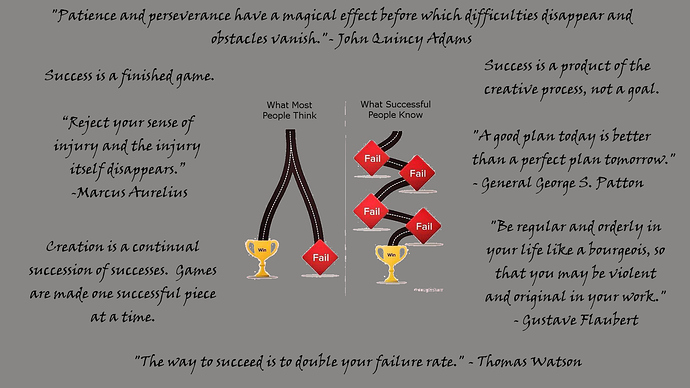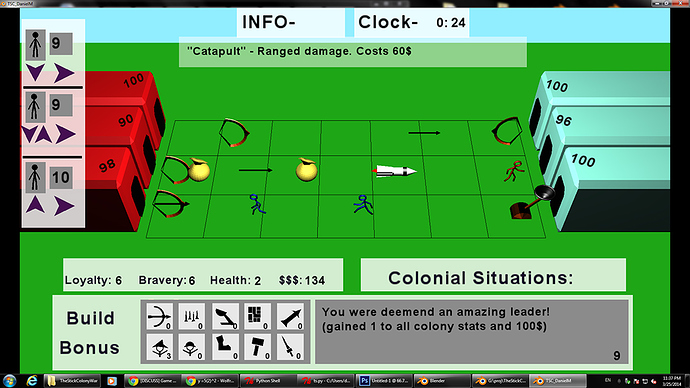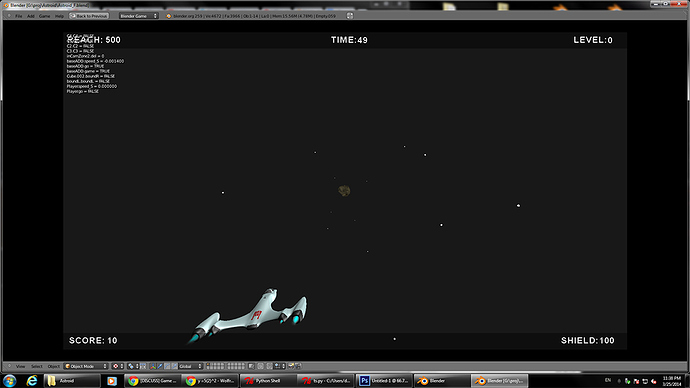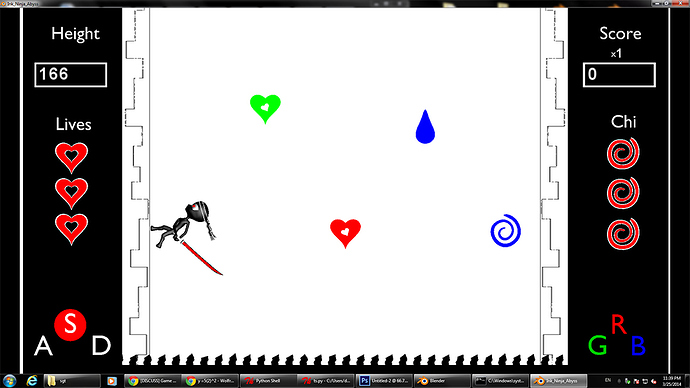Hi,
I haven’t been very involved in the game engine community here lately. Game development became sort of stale to me over the past year or so, and I turned my focus to other things. Very recently I’ve drifted back towards it with a sense of curiosity.
I’m not posting here to ask for BGE help, but just to invite anyone who’s interested to take part in a conversation about game development. Tell us about how your experience with developing games has evolved over time, what new interesting things you’ve learned, what sort of ideas you’ve come up with - which ones you kept, and which you’ve discarded or abandoned, and why.
I look over this forum section and see a lot of threads asking technical questions - which is great.
I think it’s a nice idea to be able to take a break from the details for a moment, think things over, and discuss them with others who share similar interests in a very general and open way. (This isn’t a thread to explicitly promote your games, but simply to talk about things.)
This post is a bit long, so I apologize for that. But take what you want from it.
You can safely skim/skip through the rest and make a reply of your own.
I’ll start, with a bit of history:
I picked up Blender in 2009 back in the 2.48-2.49 days, and had absolutely no 3D program experience. I discovered the game engine a while later, then delved into Python programming for game development a couple years after that.
My most noteworthy project was a maze creator game. The game played like a level editor program that had a demo-mode that would let you test the level as a first-person character. Development for it spanned around two years, and included several rewrites from the ground-up. Eventually the project became too bloated to manage, and ultimately I just lost interest. One problem was that I never set any well defined goals for it, added content as I went along, and amended bits of old code to make way for new and somewhat arbitrary features. Eventually I realized there was no meaning behind it to me, besides, perhaps, “I want to make something to make other things with.”
That game involved a lot of Python code. Programming has always been interesting to me. I think it’s neat to write code and see what kinds of results it can produce. After losing interest in game development, I got into website design/development (html, css, javascript, php, mysql), and started experimenting with making websites. PHP and JavaScript were easy to get into, since I already had a good understanding of general programming practices with Python. Now we’re at the present time. Making websites is fun, and being paid to do it can be nice (although not necessarily rewarding), but I think my true calling may be in making games.
I think it’s really interesting to spread some message or communicate with other people through games, where the game acts a medium for storytelling. The first game that comes to my mind when I think of this is Abe’s Oddysee (from the Oddworld games). On the surface, it was a fun platformer game with very detailed environments and characters, but it had a deeper meaning that related to our own lives and the world we live in.
There are other games I find interesting where the story is vague/less obvious, or completely lacking, but are nevertheless very enjoyable to play. I find that these types of games often have a lot invested into the game environment and atmosphere, which gives me a fantastic sense of exploration and wonder, and perhaps some subtle references to an underlying message that can keep you thinking about it for a while after playing. I’m thinking of games like LIMBO, Antichamber, Closure, and Bastion.
The sense of wonder and exploration of something new and foreign is something I would love to focus on attaining when making a game. It’s a very peculiar feeling to see some structure that looks interesting in the far distance of a game’s background, and want to get closer to it and find out what it’s all about. This natural human curiosity also pervades many aspects of real life as well.
To wrap this up, I’ll mention a few very general things that I think are important when thinking about making a game.
- The most important thing is to make sure that the game means something to you, or is important to you in some way. If you’re making a type of game you enjoy, then that means it’s important to you. If your game loses meaning to you, then you’ll become uninterested in working on it, and pushing yourself to do so may be a waste of time and effort.
- It’s generally a good idea to set goals. Big or small ones. Make sure they’re attainable within a reasonable amount of time respective to the type of goal they are. Working on something without goals is also possible and may result in something interesting, but as a long-term project, it is likely to become unstable.
- If you are overconfident and pick a project you can’t handle, you will soon find out that this wasn’t a realistic project for you at that moment in time. Don’t let that stop you from trying though. If you want to make the next WoW or Minecraft, then give it a try and see what happens. You’re bound to learn something along the way.
- If your project presents you with challenges, understand that those are potential learning experiences in some way or other. If you can’t get past them, try saving it for later and work on another project or activity to freshen up your mind. You may come back with a different perspective or new knowledge that can help you get past those challenges.
- The journey is often more rewarding than reaching the destination. It is easy to lose motivation on an uninteresting journey where the destination is far away.
These are just my personal thoughts, so take from them what you will.
Again, I apologize for the length of this post.
As mentioned at the top,
Feel free to add your own thoughts on your own game development experiences. Maybe it will spark up an interesting conversation.

 (mouse controlled)
(mouse controlled)

